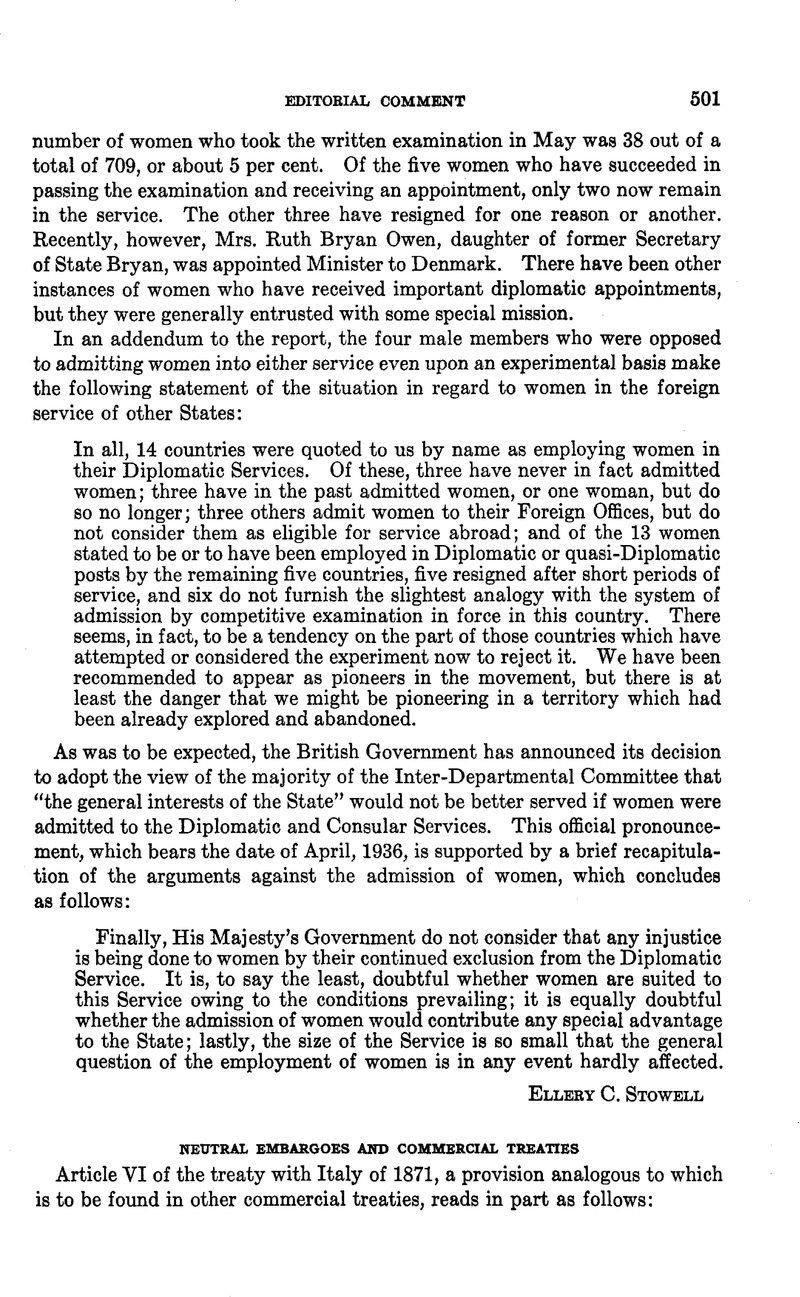No CrossRef data available.
Published online by Cambridge University Press: 12 April 2017

1 Section 4 of the original Neutrality Bill of January, 1936, S. 3474.
2 In this category belong the embargo imposed May 28, 1934, by the President on Bolivia and Paraguay under Joint Resolution of that date, and the short-lived embargo of Great Britain on China and Japan, Feb. 27, 1933. 275 Hansard (5th Ser.), Col. 57–59.
3 1870 Pasin. 432.
4 For. Rel. 1915, p. 804.
5 Naval War College Documents, 1915, p. 33 el seq. Parmelee, Blockade and Sea Power, p. 132.
6 Cong. Rec. April 21,1898, pp. 4146 (Senate) and 4170 (House), Vol. 31, 55th Cong., 2nd Sess. To the effect that “other materials used in war” meant strictly military supplies, see debates loc. cit.
7 Naval War College Documents, 1915, p. 57 et seq. See extension of 1900 Act in Customs (Exportation Restriction) Act, 1914 (5 Geo. V, c. 2). See also Baty and Morgan, War: Its Conduct and Legal Results (London, 1915), 56–58. 61 Brit. & For. St. Pap. 761, at 764.
8 Comment in 42 Yale Law Journal (1933), 1109.
9 Cf. list of commodities in statement of Secretary of State, Nov. 15, 1935.
10 Mr. Bernard Baruch, in his valuable article on “Neutrality” in Current History for June, 1936, adduces some of the practical reasons why an embargo on lethal weapons is sustainable, whereas an embargo or threatened embargo on raw materials or non-lethal commodities is dangerous to the United States, to the world, and to the cause of peace. The suggestion that “practically everything is contraband” appears in letter of Charles Warren, Senate Hearings on S. 3474 (1936), p. 254.
11 See Publication 867, Department of State, 1936. The statement of Nov. 15, 1935, supra, speaks of the commodities therein mentioned as “essential war materials although not actually arms, ammunition or implements of war,” whereas Publication 867 for the first time characterizes scrap tin as “other munitions of war.” This is not legally justified. The term “arms and munitions of war” was analyzed and defined under the Resolution of March 14, 1912, by Attorneys General Wickersham (29 Op. Atty. Gen. 375), and Mc-Reynolds (30 Op. Atty. Gen. 213 and ibid. 227), and is defined in the Traffic in Arms Convention of 1925. The term “contraband of war” is specifically defined in Art. XV of the Treaty of 1871 with Italy, an article common also to other commercial treaties. The League Committee on the Chaco embargo recommended the embargo of “arms and war materials.” This was interpreted by the sanctioning nations as covering lethal weapons only. 15 Official Journal (League of Nations), 837–839.
12 Mr. Cass, Secretary of State, to Mr. Mason, Minister to France, June 27,1859, Moore’s Dig. VII, 657. See also Jefferson in Moore’s Dig. VII, 677.
13 For the aims of the first Armed Neutrality, including limitations on the definition of contraband, see Jessup, , “American Neutrality and International Police,” World Peace Foundation Pamphlets, Vol. 11, No. 3 (1928), p. 19 Google Scholar. Also Moore’s Dig. VII, 559.
14 Jefferson, in contesting the British attempt in 1793 to keep foodstuffs out of France, maintained the right of neutral nationals “to carry the produce of their industry, for exchange, to all nations, belligerent or neutral as usual,” subject to the restriction “of not furnishing to either party implements merely of war,” commonly known as contraband, nor of carrying “anything whatever to a place blockaded.” (Amer. State Pap., For. Rel., 2d ed. 1817,1, 393.) “Merely” is here a significant word.
15 48 Stat. 943.